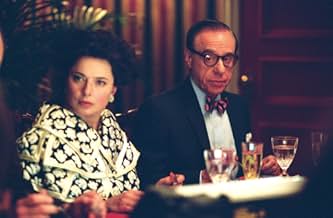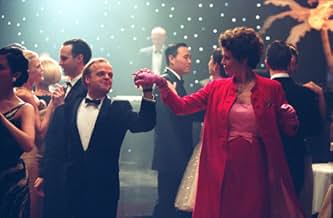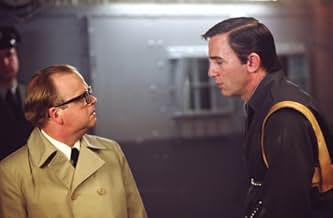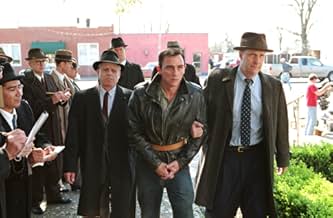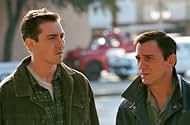AVALIAÇÃO DA IMDb
7,0/10
19 mil
SUA AVALIAÇÃO
Enquanto pesquisava para seu romance "A Sangue Frio", Truman Capote desenvolve um relacionamento íntimo com os assassinos condenados, Dick Hickock e Perry Smith.Enquanto pesquisava para seu romance "A Sangue Frio", Truman Capote desenvolve um relacionamento íntimo com os assassinos condenados, Dick Hickock e Perry Smith.Enquanto pesquisava para seu romance "A Sangue Frio", Truman Capote desenvolve um relacionamento íntimo com os assassinos condenados, Dick Hickock e Perry Smith.
- Direção
- Roteiristas
- Artistas
- Prêmios
- 3 vitórias e 2 indicações no total
Frank G. Curcio
- William Shawn
- (as Frank Curcio)
Terri Merritt Bennett
- D.A.'s Secretary
- (as Terri Bennett)
- Direção
- Roteiristas
- Elenco e equipe completos
- Produção, bilheteria e muito mais no IMDbPro
Avaliações em destaque
"INFAMOUS" ~~ THE OTHER BETTER CAPOTE ... Directed by Douglas McGrath who also wrote the screenplay for Woody Allen's "Bullets Over Broadway" (1994) and directed Paltrow in Jane Austen's "Emma", 1996. Starring Toby Jones as Truman Capote -- one of those rare cases where the actor did not "play" the role but completely entered the skin of the real life character in question. Incredibly "Infamous" was on last night on Hungarian TV, Dubbed into Hungarian but I watched it anyway, for the body language and Production values. And the general feeling of the movie. I had forgotten what an important role a deglamourised Sandra Bullock had in this picture as Capote's constant companion throughout. But the fact that this major Hollywood star was content to take a supporting role to an unknown British actor is a real mark of her professionalism. Interestingly, she smokes in just about every scene she's in, which I assume was just for the requirements of the picture. Toby Jones is head and shoulders better than Seymour Hoffman was in the role, Besides the fact that he is a dead ringer for minuscule real life Capote whereas Bulky Seymour wasn't even close. If there were anything resembling integrity In the Hollywood film world, Jones should have been a walkaway for best actor in 2007 and Bullock would have been a very worthy candidate for Best Supporting actress, female -- Come to think of it, they oughta have a special slot for "Best supporting role by a star leading actor/actress willing to take a back seat" in a quality picture.
I saw "Infamous" at the 2006 Venice film festival and recognized it then as an unsung masterpiece, far far better than the Hoffman caricature earlier the same year. It opens with an incredible turn by Gwyneth Paltrow in a long white gown as Peggy Lee doing the old standard "This must Be Love" -- but she is so touched by the inherent sadness of the song that she breaks down in the middle and has to stop. What an opener! ~ possibly the best single scene Paltrow has ever done. Which sets the tone for everything to come.
A series of interviews follows with celebrity contemporaries of Capote speaking to the camera and identified by name with on screen titles which gives the picture a documentary feel, but the name celebrities are themselves celebrity actors such as Sigourney Weaver and especially, Peter Bogdanovich as Bennet Cerf. I think this is definitely one of the very best pictures of the Decade, 2000- 2010, and one that I would like to own so I could watch it over and over. And don't forget Daniel Craig (later to be Dubble 007!) as death row killer Perry Smith who Capote falls in love with! The prison interviews are filmed in a kind of chiaro-oscuro and the 1959 Period atmosphere is unobtrusively authentic-- without parading collectors vintage cars across the screen in every outdoor scene.
"Infamous", 2006, is a true gem in every respect but fell between the cracks because it was overshadowed by the hullabaloo over the distinctly inferior Sony Pictures production -- a classic case of the triumph of publicity over Quality.
I saw "Infamous" at the 2006 Venice film festival and recognized it then as an unsung masterpiece, far far better than the Hoffman caricature earlier the same year. It opens with an incredible turn by Gwyneth Paltrow in a long white gown as Peggy Lee doing the old standard "This must Be Love" -- but she is so touched by the inherent sadness of the song that she breaks down in the middle and has to stop. What an opener! ~ possibly the best single scene Paltrow has ever done. Which sets the tone for everything to come.
A series of interviews follows with celebrity contemporaries of Capote speaking to the camera and identified by name with on screen titles which gives the picture a documentary feel, but the name celebrities are themselves celebrity actors such as Sigourney Weaver and especially, Peter Bogdanovich as Bennet Cerf. I think this is definitely one of the very best pictures of the Decade, 2000- 2010, and one that I would like to own so I could watch it over and over. And don't forget Daniel Craig (later to be Dubble 007!) as death row killer Perry Smith who Capote falls in love with! The prison interviews are filmed in a kind of chiaro-oscuro and the 1959 Period atmosphere is unobtrusively authentic-- without parading collectors vintage cars across the screen in every outdoor scene.
"Infamous", 2006, is a true gem in every respect but fell between the cracks because it was overshadowed by the hullabaloo over the distinctly inferior Sony Pictures production -- a classic case of the triumph of publicity over Quality.
Infamous has a difficult comparison with the earlier "Capote." Still it is a different view of the same story and characters and is written with more emphasis on the perspectives of those who knew, or thought they knew, Capote. Toby Jones may not fully match the nuanced performance of Philip Seymour Hoffman but he does, possibly, a better imitation of Capote. Infamous has a better known cast of supporting players and they do a creditable job. Sandra Bullock's Harper Lee isn't the quite same as that portrayed so well by Catherine Keener in "Capote" but her character blends perfectly with the tone of "Infamous." Daniel Craig adds another fine acting turn as the "In Cold Blood" killer who receives the most attention. Even Gwyneth Paltrow makes an excellent impression in a brief opening scene as, apparently, singer Peggy Lee. (In the showing I saw, she was introduced as "Kitty Dean???") I wondered why another version of this story was filmed and it may not do well after the success of "Capote" but I was surprisingly entertained and intrigued by this movie.
Writer-director Douglas McGrath's new film about Truman Capote and the creation of his most famous book, "In Cold Blood," is full of contradictions and contrasts when compared with its predecessor, the 2005 film "Capote," that covers the same five-year period. Perhaps this is fitting. There may be some justice in the fact that these two filmic accounts of how Capote researched material for his magnum opus disagree significantly in emphasis and purported events.
After all, Capote used fictional methods to embellish - some might say falsify - his journalistic reportage on the murders of the Clutter family in Holcomb, Kansas, in 1959. If the screenplays for these two films tell differing stories of Capote's experience, does it matter if one is closer to the truth than the other? Or that we can't be sure - indeed, will never know - what actually occurred during many of the encounters between Capote, who was famous for fabricating yarns about his own life, and others out in Holcomb so long ago?
The films are each based on separate biographical accounts. "Capote" was adapted from Gerald Clarke's 1988 biography bearing the same title. "Infamous" is based on George Plimpton's 1997 book, "Truman Capote: In Which Various Friends, Enemies, Acquaintances and Detractors Recall His Turbulent Career," an account presented as a sequence of quotes from interviews Plimpton conducted with more than 150 people who knew Capote.
"Infamous" is far kinder to Capote than the earlier film, portraying him as quite clearly enamored of the killer Perry Smith (an ardor fully requited by Smith) and deeply anguished when Smith is executed. "Capote" depicts the author as more conniving, manipulative and disingenuous, willing to say or do anything to get Smith to spill his story, and withholding of possible interventions he - Capote - might have made to further delay or avert the executions of Smith and his accomplice, Dick Hickock.
In "Capote" the author's erotic attraction to Smith is more muted, hinted at, not acted upon. Indeed, "Infamous" is in general more explicit and direct in its portrayals, often more graphic if you will, than "Capote." Besides kisses and embraces between Capote and Smith, other scenes not covered in "Capote" include moments of violence when Smith virtually attacks Capote in his cell. We also witness the murders of the Clutters and Hickock's execution by hanging, including the protracted interval during which his body remains vertically suspended until he is finally declared dead by the attending physician.
There are other differences, for example, Capote's bid to establish rapport with the local Sheriff, Alvin Dewey, is depicted as much more problematic in "Infamous" than in "Capote." A plus for "Infamous" is its attention to Capote's relationships with a covey of New York society women known as his "swans," their adulation of him, his ability to coax them into sharing their secrets for his later use as gossip fodder. But, again, McGrath employs a graphic style to introduce us to these women, and several others in Capote's social circle, namely, the use of large white name titles as we first meet each, documentary style.
I find it impossible to resist comparing acting performances in the two productions. The more nuanced, oblique style of "Capote" is realized not only through its general avoidance of graphic scenes but in the greater subtlety of the two central actors' performances. In "Infamous," the English character actor Toby Jones physically resembles Capote more than does his counterpart in "Capote," Philip Seymour Hoffman. Both actors offer convincing personifications in voice and style. But I lean toward Hoffman's as the more complex, accomplished turn, characterized by critic Shawn Levy as "note-perfect." Levy goes on, "The wheezy laugh, the pain of work, the prying nature, the cold eye, the self-obsession, the ability to perform and ingratiate and wheedle - it's Capote you're watching up there "
The brilliant English actor Daniel Craig gives a forceful, indeed galvanizing, performance as the killer, Perry Smith. But I think his mercurial, intensely melodramatic interpretation of his character is less convincing than his counterpart in "Capote," Clifton Collins, Jr. Collins's Smith is more introverted, by turns chilling or vulnerable to be sure, but for the most part quietly opaque, subdued, soulfully melancholic. For me this depiction is the more compelling and believable.
Other key performances are well delivered in both films: Catherine Keener ("Capote") and Sandra Bullock ("Infamous") as Harper Lee, though I liked Ms. Bullock's turn better; Chris Cooper ("Capote") and Jeff Daniels ("Infamous") as Sheriff Dewey. Capote's "swans" in "Infamous" are delightfully played by Sigourney Weaver, Juliet Stevenson, Hope Davis and Isabella Rossellini.
So we have two versions of the story of Capote's adventures in Kansas: both strong films, well cast, worthwhile. I think "Capote" is the better film because of its more subtle approach and the performances of the two central actors. As for realism in the interpretation of Truman Capote's character, perhaps the two portrayals taken together triangulate on the "real" Capote, a complex, convoluted personality as worthy of our sympathy as our contempt. My grades: 8/10 (high B+) (Seen on 10/10/06)
After all, Capote used fictional methods to embellish - some might say falsify - his journalistic reportage on the murders of the Clutter family in Holcomb, Kansas, in 1959. If the screenplays for these two films tell differing stories of Capote's experience, does it matter if one is closer to the truth than the other? Or that we can't be sure - indeed, will never know - what actually occurred during many of the encounters between Capote, who was famous for fabricating yarns about his own life, and others out in Holcomb so long ago?
The films are each based on separate biographical accounts. "Capote" was adapted from Gerald Clarke's 1988 biography bearing the same title. "Infamous" is based on George Plimpton's 1997 book, "Truman Capote: In Which Various Friends, Enemies, Acquaintances and Detractors Recall His Turbulent Career," an account presented as a sequence of quotes from interviews Plimpton conducted with more than 150 people who knew Capote.
"Infamous" is far kinder to Capote than the earlier film, portraying him as quite clearly enamored of the killer Perry Smith (an ardor fully requited by Smith) and deeply anguished when Smith is executed. "Capote" depicts the author as more conniving, manipulative and disingenuous, willing to say or do anything to get Smith to spill his story, and withholding of possible interventions he - Capote - might have made to further delay or avert the executions of Smith and his accomplice, Dick Hickock.
In "Capote" the author's erotic attraction to Smith is more muted, hinted at, not acted upon. Indeed, "Infamous" is in general more explicit and direct in its portrayals, often more graphic if you will, than "Capote." Besides kisses and embraces between Capote and Smith, other scenes not covered in "Capote" include moments of violence when Smith virtually attacks Capote in his cell. We also witness the murders of the Clutters and Hickock's execution by hanging, including the protracted interval during which his body remains vertically suspended until he is finally declared dead by the attending physician.
There are other differences, for example, Capote's bid to establish rapport with the local Sheriff, Alvin Dewey, is depicted as much more problematic in "Infamous" than in "Capote." A plus for "Infamous" is its attention to Capote's relationships with a covey of New York society women known as his "swans," their adulation of him, his ability to coax them into sharing their secrets for his later use as gossip fodder. But, again, McGrath employs a graphic style to introduce us to these women, and several others in Capote's social circle, namely, the use of large white name titles as we first meet each, documentary style.
I find it impossible to resist comparing acting performances in the two productions. The more nuanced, oblique style of "Capote" is realized not only through its general avoidance of graphic scenes but in the greater subtlety of the two central actors' performances. In "Infamous," the English character actor Toby Jones physically resembles Capote more than does his counterpart in "Capote," Philip Seymour Hoffman. Both actors offer convincing personifications in voice and style. But I lean toward Hoffman's as the more complex, accomplished turn, characterized by critic Shawn Levy as "note-perfect." Levy goes on, "The wheezy laugh, the pain of work, the prying nature, the cold eye, the self-obsession, the ability to perform and ingratiate and wheedle - it's Capote you're watching up there "
The brilliant English actor Daniel Craig gives a forceful, indeed galvanizing, performance as the killer, Perry Smith. But I think his mercurial, intensely melodramatic interpretation of his character is less convincing than his counterpart in "Capote," Clifton Collins, Jr. Collins's Smith is more introverted, by turns chilling or vulnerable to be sure, but for the most part quietly opaque, subdued, soulfully melancholic. For me this depiction is the more compelling and believable.
Other key performances are well delivered in both films: Catherine Keener ("Capote") and Sandra Bullock ("Infamous") as Harper Lee, though I liked Ms. Bullock's turn better; Chris Cooper ("Capote") and Jeff Daniels ("Infamous") as Sheriff Dewey. Capote's "swans" in "Infamous" are delightfully played by Sigourney Weaver, Juliet Stevenson, Hope Davis and Isabella Rossellini.
So we have two versions of the story of Capote's adventures in Kansas: both strong films, well cast, worthwhile. I think "Capote" is the better film because of its more subtle approach and the performances of the two central actors. As for realism in the interpretation of Truman Capote's character, perhaps the two portrayals taken together triangulate on the "real" Capote, a complex, convoluted personality as worthy of our sympathy as our contempt. My grades: 8/10 (high B+) (Seen on 10/10/06)
Everyone's seen the 2005 drama Capote, which won Phillip Seymour Hoffman his Best Actor Oscar, but how many people have seen Infamous, the exact same story filmed at the exact same time but was held back a year because the other made earlier festival deadlines? If you've only seen Hoffman's performance, you owe it to Toby Jones and everyone who put their talent into the later film to rent Infamous.
I've seen them both, and there's a remarkable difference. Capote bored me to tears; I actually nodded off to sleep a couple of times. I barely remembered the sequence of scenes, and in fact, when I watched Infamous, some of the events were a surprise to me even though I was supposed to have seen them before. The 2006 film was entertaining, riveting, and many of the scenes will stay in my memory forever. Writer-director Douglas McGrath delivered his specialty: fast-paced, witty, emotional, and complex.
To pay homage to the true crime genre pioneered by Truman Capote's In Cold Blood, McGrath made his film a combination of dramatic fiction and mockumentary. Interview testimony from Capote's friends (Sigourney Weaver, Sandra Bullock, Peter Bogdanovich, Juliet Stevenson, John Benjamin Hickey, Jeff Daniels, and Isabella Rossellini) is intercut with scenes that drive the plot forward. Just as Capote alters the truth to suit his writing, McGrath adds fictional elements to the plot. This is, simply put, the greatest tribute to Truman Capote's writing style.
While the plot itself isn't my usual fare, I always love watching movies that feature fantastic performances. I don't like grizzly murder mysteries, and I'll admit to looking away from the television set during the gruesome scenes. In both films, Truman Capote is inspired to write the first true crime novel by a terrible small-town murder. He travels with his writer pal Harper Lee to interview the townsfolk, and he ends up spending a great deal of time talking with the murderers in prison. Does the brooding criminal who guards his words carefully look familiar? Probably not, but wash off the brunette rinse, take out the brown contacts, and replace the American accent with an English one. . . The same year Daniel Craig made a splash in his first James Bond flick, he was also in Infamous - and he was fantastic. Don't feel bad if you don't recognize him and have a, "Where's Fredric March?" moment. A large part of the story is Capote's quest to humanize the murderers, and the scenes between Jones and Craig are multifaceted and extremely well-acted.
If you don't really know who Truman Capote is, you'll love Phillip Seymour Hoffman's portrayal. He's the guy that dresses and talks funny, right? If you actually remember the "eccentric" author, you'll continually pinch yourself as you watch Toby Jones. It was an effort to keep reminding myself that I wasn't actually watching Truman Capote spliced alongside modern actors. In some scenes, he personifies "light in the loafers" and passes gossip amongst his friends for entertainment; in others, he's so emotionally conflicted the audience is free to take their own interpretation. Depending on your point of view, you can see Capote as a selfish manipulator consumed by his novel, or a tormented soul who desperately wants to create a fictional world to improve what really happened. Since both sides can be argued, Toby Jones is remarkable.
In a major chunk of the film, Jones is challenged by Craig's reluctance to share his story. The other murderer, Lee Place, is very open, but Craig maintains he's a human being, not a character in a story. Years ago, I took a directing course that focused on working with actors. Our assignment during each scene was to write out a different motivation behind every line of dialogue, to help our actors give better performances. In Infamous, Jones runs through every conceivable motivation as he tries to figure out what will make Craig trust him enough to open up about his feelings. He offers logic, money, and emotional blackmail; he sends him different types of literature to read in his cell; he makes any number of promises about the tone he'll take with the book and shares his own sad stories. It's both exhausting and interesting to watch.
Jones perfects the art of finding out what each person in his life needs and giving it to them, but is the mere satisfaction of being a chameleon enough? He gives a little smirk at the time, but as the high fades, he needs either more or different to keep him happy. In one scene, he breaks down in exhaustion and confesses to his friends that the years have taken their toll. Just as you think he's going to reveal his true feelings, he offers a comment on his book instead. It's one of his many moments of brilliance that keep you in a constant state of unease.
Rent Infamous. It'll surprise you. Sandra Bullock masters the Alabama accent, which you know is no small feat if you've ever studied different dialects. Daniel Craig is unrecognizable, and Toby Jones is perfect. I could write pages praising Toby Jones's performance, but I couldn't say it any better than Rex Reed did in The New York Observer: "They gave the Oscar to the wrong Truman Capote. ... (Hoffman) was doing an impression. In Infamous ... a diminutive actor with a titanic talent named Toby Jones literally becomes the man himself. This is no lisping impersonation learned from watching old Johnny Carson shows: Mr. Jones moves into Truman's skin, heart, and brains. Infamous shows you the man's soul."
Kiddy Warning: Obviously, you have control over your own children. However, due to violence and adult content, I wouldn't let my kids see it.
I've seen them both, and there's a remarkable difference. Capote bored me to tears; I actually nodded off to sleep a couple of times. I barely remembered the sequence of scenes, and in fact, when I watched Infamous, some of the events were a surprise to me even though I was supposed to have seen them before. The 2006 film was entertaining, riveting, and many of the scenes will stay in my memory forever. Writer-director Douglas McGrath delivered his specialty: fast-paced, witty, emotional, and complex.
To pay homage to the true crime genre pioneered by Truman Capote's In Cold Blood, McGrath made his film a combination of dramatic fiction and mockumentary. Interview testimony from Capote's friends (Sigourney Weaver, Sandra Bullock, Peter Bogdanovich, Juliet Stevenson, John Benjamin Hickey, Jeff Daniels, and Isabella Rossellini) is intercut with scenes that drive the plot forward. Just as Capote alters the truth to suit his writing, McGrath adds fictional elements to the plot. This is, simply put, the greatest tribute to Truman Capote's writing style.
While the plot itself isn't my usual fare, I always love watching movies that feature fantastic performances. I don't like grizzly murder mysteries, and I'll admit to looking away from the television set during the gruesome scenes. In both films, Truman Capote is inspired to write the first true crime novel by a terrible small-town murder. He travels with his writer pal Harper Lee to interview the townsfolk, and he ends up spending a great deal of time talking with the murderers in prison. Does the brooding criminal who guards his words carefully look familiar? Probably not, but wash off the brunette rinse, take out the brown contacts, and replace the American accent with an English one. . . The same year Daniel Craig made a splash in his first James Bond flick, he was also in Infamous - and he was fantastic. Don't feel bad if you don't recognize him and have a, "Where's Fredric March?" moment. A large part of the story is Capote's quest to humanize the murderers, and the scenes between Jones and Craig are multifaceted and extremely well-acted.
If you don't really know who Truman Capote is, you'll love Phillip Seymour Hoffman's portrayal. He's the guy that dresses and talks funny, right? If you actually remember the "eccentric" author, you'll continually pinch yourself as you watch Toby Jones. It was an effort to keep reminding myself that I wasn't actually watching Truman Capote spliced alongside modern actors. In some scenes, he personifies "light in the loafers" and passes gossip amongst his friends for entertainment; in others, he's so emotionally conflicted the audience is free to take their own interpretation. Depending on your point of view, you can see Capote as a selfish manipulator consumed by his novel, or a tormented soul who desperately wants to create a fictional world to improve what really happened. Since both sides can be argued, Toby Jones is remarkable.
In a major chunk of the film, Jones is challenged by Craig's reluctance to share his story. The other murderer, Lee Place, is very open, but Craig maintains he's a human being, not a character in a story. Years ago, I took a directing course that focused on working with actors. Our assignment during each scene was to write out a different motivation behind every line of dialogue, to help our actors give better performances. In Infamous, Jones runs through every conceivable motivation as he tries to figure out what will make Craig trust him enough to open up about his feelings. He offers logic, money, and emotional blackmail; he sends him different types of literature to read in his cell; he makes any number of promises about the tone he'll take with the book and shares his own sad stories. It's both exhausting and interesting to watch.
Jones perfects the art of finding out what each person in his life needs and giving it to them, but is the mere satisfaction of being a chameleon enough? He gives a little smirk at the time, but as the high fades, he needs either more or different to keep him happy. In one scene, he breaks down in exhaustion and confesses to his friends that the years have taken their toll. Just as you think he's going to reveal his true feelings, he offers a comment on his book instead. It's one of his many moments of brilliance that keep you in a constant state of unease.
Rent Infamous. It'll surprise you. Sandra Bullock masters the Alabama accent, which you know is no small feat if you've ever studied different dialects. Daniel Craig is unrecognizable, and Toby Jones is perfect. I could write pages praising Toby Jones's performance, but I couldn't say it any better than Rex Reed did in The New York Observer: "They gave the Oscar to the wrong Truman Capote. ... (Hoffman) was doing an impression. In Infamous ... a diminutive actor with a titanic talent named Toby Jones literally becomes the man himself. This is no lisping impersonation learned from watching old Johnny Carson shows: Mr. Jones moves into Truman's skin, heart, and brains. Infamous shows you the man's soul."
Kiddy Warning: Obviously, you have control over your own children. However, due to violence and adult content, I wouldn't let my kids see it.
"There will be time to murder and create." T.S. Eliot's Prufrock
Truman Capote described murderer Perry Smith as between the "tender and the terrible." Such may be said about writer/director Douglas McGrath's superior Infamous, a tale of Truman Capote's (Toby Jones) love affair with his innovative novelization, In Cold Blood, and its protagonist,Perry Smith (Daniel Graig). The tender is Capote's love of his female friends, especially Harper Lee (Sandra Bullock) and Smith (DanielCraig), and the terrible slaughter of the Kansas farm family in 1959 by Smith and friend Dick Hickock (Lee Pace).
Inevitable as accusing Toby Jones of only imitating Capote is the comparison with Philip Seymour Hoffman's Oscar performance of the titular author in Capote (1955). Jones's turn is more complex than Hoffman's, alternating between Capote's imaginative connection with the crime and his growing respect, even love, for Smith. In fact, the well-known love between the men is avoided in Capote but highlighted in Infamous.
I was hooked in the first sequence, when Gwyneth Paltrow as Peggy Lee sings "What is this thing called love?" and breaks down in apparent awareness of her own losses. The song, perfect for the themes of the film, and the film's score carry a melancholy with them that McGrath captures in Tru's constantly frustrated search for truth and love and Lee's inability to pen another novel after her Pulitzer-Prize-winning To Kill a Mockingbird. For that matter, Capote never completes a significant piece after that himself.
Last year's Capote seemed centered on the conflict in Truman over whether or not he was exploiting Smith to get a story and then never fully engaging a campaign to free them. This year's Infamous (a poor title regardless of it double artistic appropriateness) is more interested in Truman's struggle to write a new kind of fiction (docudrama) and his true affection for Smith. Infamous fleshes out the story and the fabulous artist whose "Breakfast at Tiffany's" and "In Cold Blood" are cultural staples of 20th century life.
Truman Capote described murderer Perry Smith as between the "tender and the terrible." Such may be said about writer/director Douglas McGrath's superior Infamous, a tale of Truman Capote's (Toby Jones) love affair with his innovative novelization, In Cold Blood, and its protagonist,Perry Smith (Daniel Graig). The tender is Capote's love of his female friends, especially Harper Lee (Sandra Bullock) and Smith (DanielCraig), and the terrible slaughter of the Kansas farm family in 1959 by Smith and friend Dick Hickock (Lee Pace).
Inevitable as accusing Toby Jones of only imitating Capote is the comparison with Philip Seymour Hoffman's Oscar performance of the titular author in Capote (1955). Jones's turn is more complex than Hoffman's, alternating between Capote's imaginative connection with the crime and his growing respect, even love, for Smith. In fact, the well-known love between the men is avoided in Capote but highlighted in Infamous.
I was hooked in the first sequence, when Gwyneth Paltrow as Peggy Lee sings "What is this thing called love?" and breaks down in apparent awareness of her own losses. The song, perfect for the themes of the film, and the film's score carry a melancholy with them that McGrath captures in Tru's constantly frustrated search for truth and love and Lee's inability to pen another novel after her Pulitzer-Prize-winning To Kill a Mockingbird. For that matter, Capote never completes a significant piece after that himself.
Last year's Capote seemed centered on the conflict in Truman over whether or not he was exploiting Smith to get a story and then never fully engaging a campaign to free them. This year's Infamous (a poor title regardless of it double artistic appropriateness) is more interested in Truman's struggle to write a new kind of fiction (docudrama) and his true affection for Smith. Infamous fleshes out the story and the fabulous artist whose "Breakfast at Tiffany's" and "In Cold Blood" are cultural staples of 20th century life.
Você sabia?
- CuriosidadesThis film appeared not long after the film Capote (2005). While Infamous goes deeper into the background of the killers, Capote focuses intensely on the relationship between Capote and Smith. As such, the two films could be considered to be companion pieces.
- Erros de gravaçãoEarly in the movie Harper Lee and Capote order drinks in a Holcomb, Kansas restaurant. At the time of the movie's action, Kansas was dry as a bone. You couldn't buy a drink in a Kansas restaurant until state liquor laws began to change in the mid '80s.
- Citações
Truman Capote: Imagine being told your work lacked kindness by a four-time killer!
Principais escolhas
Faça login para avaliar e ver a lista de recomendações personalizadas
- How long is Infamous?Fornecido pela Alexa
Detalhes
- Data de lançamento
- País de origem
- Central de atendimento oficial
- Idioma
- Também conhecido como
- Infamous
- Locações de filme
- Marlin, Texas, EUA(Courthouse exterior and interior scenes)
- Empresas de produção
- Consulte mais créditos da empresa na IMDbPro
Bilheteria
- Orçamento
- US$ 13.000.000 (estimativa)
- Faturamento bruto nos EUA e Canadá
- US$ 1.151.330
- Fim de semana de estreia nos EUA e Canadá
- US$ 452.966
- 15 de out. de 2006
- Faturamento bruto mundial
- US$ 2.689.799
- Tempo de duração
- 1 h 50 min(110 min)
- Cor
- Mixagem de som
- Proporção
- 1.85 : 1
Contribua para esta página
Sugerir uma alteração ou adicionar conteúdo ausente





